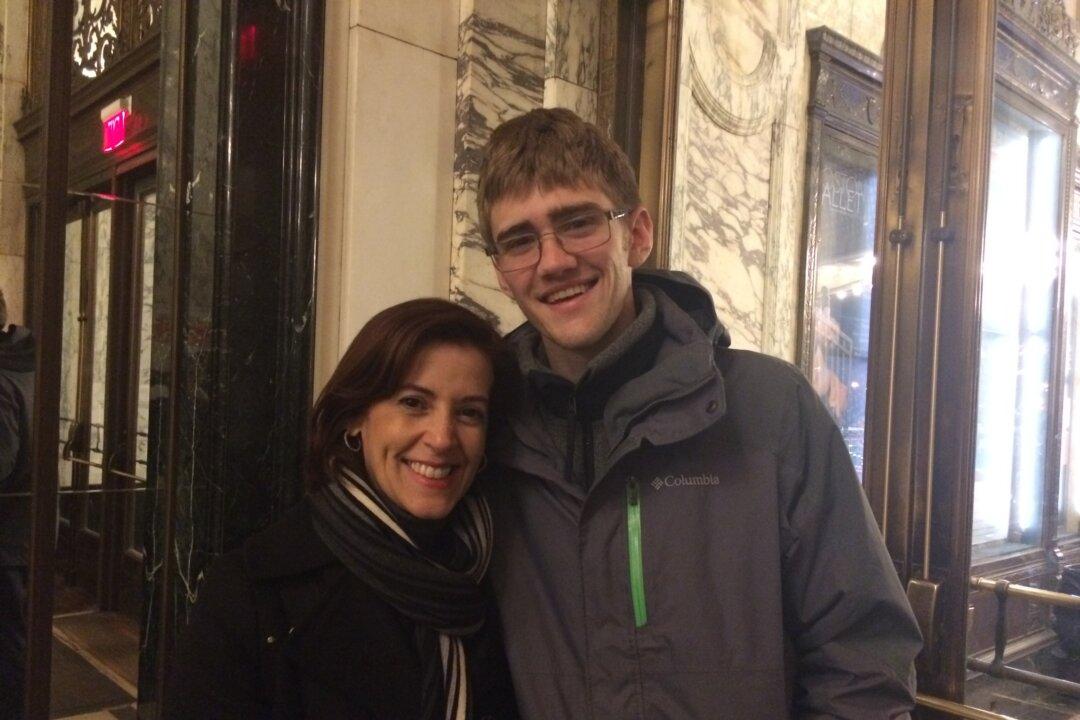BOSTON— Dzhokhar Tsarnaev kept his eyes glued to the floor, as he repeated “Not guilty,” to a list of 30 federal charges brought against him for his suspected role in the Boston Marathon bombings.
Tsarnaev was arraigned Wednesday in courtroom 10 of the Moakley Federal courthouse in Boston, Mass. His lawyer Judy Clarke, an expert in death penalty cases, attempted to enter a not guilty plea for all charges, but the judge insisted that the charges be read one by one and that Tsarnaev speak for himself.
Tsarnaev slouched in his chair listening to the charges, resting his chin on the cast around his right hand. His eyes wandered around the room, settling on his two sisters, one of them holding a baby.
He shifted uneasily in his seat, looking very young and a bit distracted.
This was his first appearance in public since his capture in mid-April. He appeared to have a jaw injury and there was swelling around his left eye and cheek.
Tsarnaev has been held at the Fort Devens military hospital since his capture, where he has been treated for wounds suffered in the aftermath of the April 15 bombings.
He faces 66 charges total, 30 of them federal, including using a weapon of mass destruction to kill. He faces of maximum penalty of life imprison or death, if prosecutors chose to pursue it.
Authorities say Tsarnaev orchestrated the bombing along with his older brother, Tamerlan Tsarnaev, who died following a gun battle with police three days after the attack.
Dzhokhar Tsarnaev was arrested on April 19, hiding in a bloodstained boat in a suburban backyard after a manhunt that paralyzed much of the Boston area.
Prosecutors say Tsarnaev, a Muslim, wrote about his motivations for the bombing on the inside walls and beams of the boat.
He scrawled that the U.S. government was “killing our innocent civilians,” and also wrote: “We Muslims are one body, you hurt one you hurt us all.”
In this already high profile case the judge, U.S. Magistrate Judge Marianne Bowler, made a point of saying, “This court frowns upon the sealing of judicial documents because the public has the right to know about the proceedings.”
The trial is expected to last three to four months as the prosecution plans to bring 80 to 100 witnesses to the stand.
The courtroom was filled to capacity with victims and their families, police officers, media, and members of the public, some of whom came out in support of Tsarnaev.
Mary Chubuck of Freetown, Mass., and Hailey Goodin of Boston, waited in line for more than three hours in order to watch the 7-minute preceding. They don’t know Tsarnaev personally but they came out to support him anyway, firm in their belief that he is innocent.
“I just think he was framed by the government,” Goodin said, “There are too many things that don’t add up.”
A thin girl in a white dress stood in line patiently, crying quietly. Tension was palpable between friends of victims and supporter of Tsarnaev as they waited together.
Outside the courthouse crowds gathered on the street.
A line of more than 20 MIT police officers stood at attention across the street. They came out in honor of Officer Sean Collier who was killed in a shootout during the search following the bombings.
Officer Tony Rosanio worked with Collier every day for 18 months. “It is very emotional to be here. You can ask my wife, I shed tears last night.”
It was important to him to come out in honor of his friend, “Everyone one who could be here came,” he said.
According to MIT Deputy Chief Jay Peault about one-third of the campus police force came out.
MIT Police Chief John DiFava, who was in the courtroom, said Tsarnaev looked “calm,” and “very professional.”
“It just seemed to me that if I was in that position, I would have been a lot more nervous, certainly scared,” DiFava said.
For many locals the events surrounding the bombings have hit just a little too close to home.
“I have friends who live in the area and that just freaked me out,” said UMass Amherst Student Chris Caro, who took the day off work at the nearby statehouse to come see the arraignment for himself.
Not everyone in the crowd has his or her mind made up.
Eva Nicole, a junior at local high school Boston Latin Academy and her friend Michael Leary sat on a concrete barricade outside the courthouse, just watching.
“I don’t have thoughts that he is guilty or innocent, I don’t know what happened.” Nicole said.
She doesn’t know Tsarnaev personally. She sees him as one of her peers. “You have to pay attention,” she explains, “I just want to know that truth.”
On the same day as the arraignment, Boston’s Police Commissioner Edward Davis, appeared on Capitol Hill and complained to a Senate panel that the Justice Department failed to share information on terrorism threats with local officials before the bombing.
“There is a gap with information sharing at a higher level while there are still opportunities to intervene in the planning of these terrorist events,” Davis said.
The upcoming trial will hopefully shed some light on just what happened in the days after April 15, but one thing is certain, Boston isn’t quite the same place it was.
The Associated Press contributed to the report.




